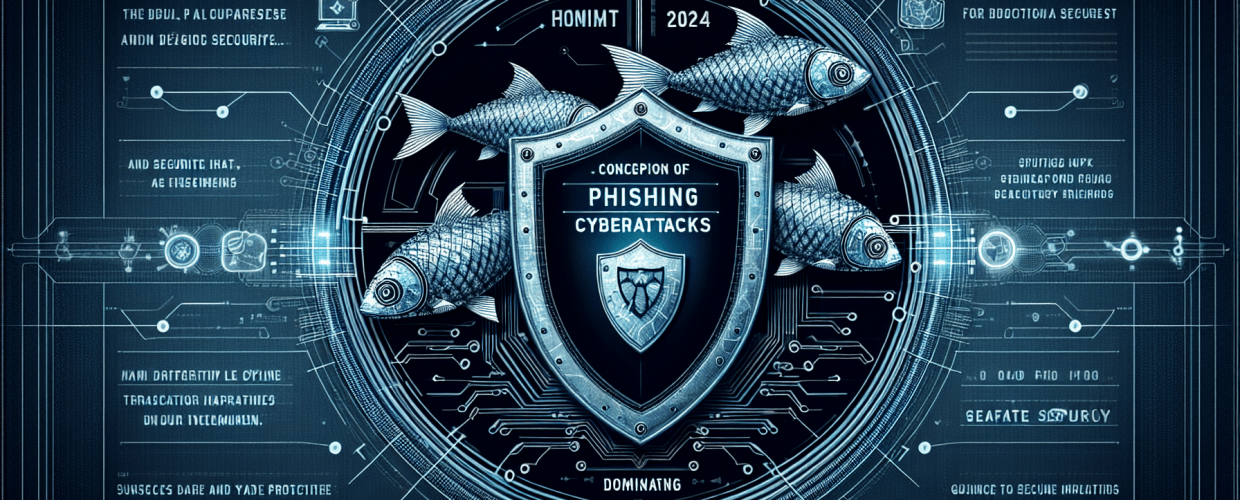Graphic Designers’ Alert: Phishing Cyberattacks Dominate in 2024 – Your Guide to Online Security & Data Protection
Staying safe online is a big deal for everyone, especially for us creatives handling client files and personal data. A recent report dropped a bombshell: phishing cyberattacks are leading the pack in 2024. These aren’t just random emails anymore; they’re getting super sophisticated. So, how do we protect ourselves and our valuable work? Let’s break it down:
- What is phishing and why is it so prevalent? We’ll explore how these tricky scams work and why they’re the biggest threat this year.
- Beyond phishing: What other cyberattacks should designers be aware of?
- Your data, your rights: Understanding personal data protection and what companies like Massive Media Lda. do to keep your info safe.
- Browsing smartly: How understanding terms of use and cookies can empower your online security.
- Quick action plan: What steps to take if you suspect a cyberattack or a data breach.
This guide will dive into these threats, the risks they pose, and the best ways to keep your personal data and online privacy locked down. Massive Media Lda. also sets strict rules for its users, which gives us a good framework to consider.
Why is Phishing the Top Cyberattack Threat in 2024, especially for Creatives?
Phishing, a sneaky tactic where attackers pretend to be trusted sources, has cemented its spot as the number one cyberattack threat in 2024. Whether it’s through convincing emails, text messages, or fake websites, the goal is always the same: to trick you into clicking malicious links, downloading infected attachments, or giving away sensitive stuff like login credentials, bank details, or client files. A single click can cost you dearly, underscoring why constant vigilance is key, especially when you’re dealing with design assets and client communications.
The rise of phishing isn’t just about clever tech; it’s about exploiting human psychology. Attackers use social engineering to manipulate us, making awareness our first line of defense. These cyberattacks are always evolving, getting more complex and frequent, so we all need to be proactive.
What are the common cyberattacks besides phishing, and how do they impact online security?
Beyond phishing, the world of cyberattacks includes a whole spectrum of threats that can compromise your online security. While we’re focused on protecting content and data, it’s worth knowing about other illicit actions:
- Unauthorized Access: Think of it as someone trying to sneak into your design software or client portals to steal or mess with your project files.
- Vulnerability Testing & Security Breaches: Hackers constantly look for weaknesses in systems, like a flawed plugin or an outdated design tool, to exploit.
- Malware Installation: This is when malicious software, like a virus, is secretly installed to damage your system or swipe your creative assets.
- Denial of Service (DoS) Attacks: Imagine your design website or portfolio crashing because it’s overwhelmed with fake traffic, making it unavailable to legitimate clients.
- Content Usurpation & Misuse: This is a big one for designers. It’s the unauthorized copying, distribution, or even branding of your original texts and images. For graphic designers, understanding file types and protecting your digital assets is crucial here.
Each of these cyberattacks poses a significant risk to the integrity of your data and your privacy. Massive Media Lda. highlights that attacking or illicitly using their systems carries legal and financial consequences. The digital landscape is complex, full of diverse networks and constant threats, so both companies and individuals need to stay defensive and informed to keep online security tight.
How does data protection safeguard your personal information, and what are your rights?
Protecting your personal data is a cornerstone of solid online security. Any information that can identify you—like your name, email, or even IP address—is considered “personal data.” Knowing what this means is the first step to understanding why its handling is so vital.
Massive Media Lda. outlines several reasons they process personal data, always with your consent. These might include:
- Sending you newsletters and direct marketing about design trends or services.
- Creating customer profiles to tailor content and offers.
- Processing and invoicing orders for your design projects.
- Managing inquiries and feedback.
As a data subject, you have some serious rights:
- Access: You can ask for confirmation and information about how your data is being handled.
- Rectification: If something’s wrong or incomplete, you can get it corrected.
- Withdraw Consent: You can always revoke permission for your data to be processed.
- Erasure: Under certain conditions, you can ask for your data to be deleted.
- Restriction of Processing: You can request limitations on how your data is used.
- Data Portability: You have the right to receive your data in a structured format and transfer it to another service.
- Object to Automated Decisions: You shouldn’t be subject to decisions that significantly affect you based solely on automated processes.
- Complaint: If you feel your rights are violated, you can file a complaint with the relevant data protection authority.
Massive Media Lda. provides specific channels (email and mail) for you to exercise these rights, showing their commitment to data protection. Knowing these rights is crucial for safe digital interactions and secure online presence.
How do website terms of use and cookies affect your secure online browsing experience?
For truly secure browsing, it’s super important to grasp the “Terms of Use” and “Cookie Policy” of any website you visit. With Massive Media Lda., these conditions are clear, designed to protect both the company and you. The website’s terms of use spell out what you can and can’t do, highlighting that copying, changing, or distributing content without explicit permission is off-limits – a critical point for designers who understand intellectual property.
Using cookies is another common practice that helps websites remember you, offering a more personalized and secure experience. But you should always be aware of how cookies are used and what data they collect, so you can control your privacy preferences. Many design tools and platforms rely on cookies for functionality.
As an internet user, you’re responsible for understanding the risks involved, like potential intrusions from third parties or data transfers that aren’t fully encrypted. Massive Media Lda. clarifies they aren’t responsible for accidental or intentional damage caused by third parties, or for any harm from using their service, including virus contamination. This really emphasizes the need for individual vigilance and using personal security software to reduce the risks linked to secure online browsing.
What measures do companies like Massive Media Lda. take to ensure your data security and privacy?
Given how dominant cyberattacks like phishing are, companies have a big responsibility to put in place strong online security measures. Massive Media Lda. states its commitment to protecting the personal data you provide, having implemented “strict rules” to do so. This means a blend of technical and organizational security measures to shield your data from being spread, lost, misused, altered, or accessed without permission.
Massive Media Lda. also makes sure that any third-party contractors processing personal data on their behalf are required to use appropriate technical and security measures, always sticking to current legislation. Sharing personal data with other entities (like group companies, partners, or tax authorities) only happens under specific conditions and always within legal boundaries. If data needs to be transferred outside of Portugal or the EU, the company strictly follows applicable legal provisions, making sure the destination country offers adequate data protection. These practices show a continuous effort to build a reliable digital environment where user data privacy is taken seriously, which is key to fighting off those ever-present cyberattacks.
What should you do if you suspect a cyberattack or data breach has occurred?
Even with all our best efforts, a cyberattack like phishing can still happen. Knowing exactly how to react is vital to minimize damage and protect your information. If you suspect a phishing attempt, never click on links, don’t open attachments, and certainly don’t give away any personal data. Delete the message right away, and if you can, report it to your email provider or the relevant authorities. For graphic designers, this could mean protecting your client lists or project files.
If there’s a data breach or unauthorized access to your accounts, act fast:
- Immediately change all your passwords, especially for compromised accounts and any others where you used the same password. Think about a password manager!
- Contact your financial institution or service provider if banking details are involved.
- Keep an eye on your bank accounts and credit reports for any suspicious activity.
- File a complaint with your country’s data protection authority.
- Reach out to the company in question (for this article, Massive Media Lda. at info@pmemagazine.com) to report the incident.
Being proactive is your strongest defense in the world of online security, and knowing these steps can make all the difference in protecting yourself from cyberattacks and their fallout.
Why is a strong privacy policy essential for fighting phishing and boosting online trust?
A well-defined and transparent privacy policy is a super important tool in the fight against phishing and for building solid online security. It doesn’t just tell you how your data is collected, handled, and protected; it also lays the groundwork for digital trust. Massive Media Lda. has a detailed privacy policy, emphasizing the confidentiality of personal data and acknowledging the inherent risks of the internet, like potential data capture and transfer by third parties.
When you take the time to read and understand a privacy policy, you can make smarter decisions about what information you share and with whom. This empowers you to spot suspicious activities that might point to phishing or other cyberattacks, because you’ll have a clear idea of how a legitimate entity should handle your data. So, a robust privacy policy isn’t just legal jargon; it’s a visible commitment to data protection and a crucial piece of building a safer digital space for everyone, including graphic designers.
Keeping Your Digital Studio Safe: Key Takeaways for Creatives
The fact that phishing cyberattacks are leading in 2024 is a stark reminder: we all need to be vigilant online. Online security isn’t just for big corporations; it’s a personal responsibility for every designer. Understanding the risks, knowing your data protection rights, and adopting safe browsing habits helps us collectively build a more resilient internet against these threats.
Here’s what you need to remember:
- Stay Alert: Always double-check emails and links, especially if they ask for sensitive information or seem too good to be true.
- Know Your Rights: Understand how your personal data is used and what you can do to control it.
- Be Proactive: Use strong, unique passwords, and consider two-factor authentication for critical accounts.
- Educate Yourself: Keep up-to-date on the latest cyber threats and security best practices.
Massive Media Lda., with its clear terms of use and privacy policy, offers a great example of how organizations should approach these critical issues, providing the tools and info we need to protect ourselves. Let’s make sure our digital presence is as secure as our creative output!
Need More Info or Have Questions?
For a deeper dive into online security, data protection, and how Massive Media Lda. operates, check out their full terms and conditions on their website. If you have any questions about your subscriptions or personal data, don’t hesitate to contact Massive Media Lda. at info@pmemagazine.com or call 211 934 140 (weekdays, 9:30 AM to 6:30 PM). Stay informed, be skeptical, and protect your digital space from phishing and other cyberattacks.


